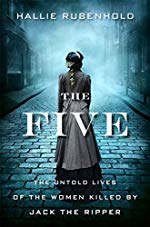The Five
May 23, 2019 8:56 PM - by Hallie Rubenhold - Subscribe
Five devastating human stories and a dark and moving portrait of Victorian London—the untold lives of the women killed by Jack the Ripper.
Polly, Annie, Elizabeth, Catherine and Mary-Jane are famous for the same thing, though they never met. They came from Fleet Street, Knightsbridge, Wolverhampton, Sweden, and Wales. They wrote ballads, ran coffee houses, lived on country estates, they breathed ink-dust from printing presses and escaped people-traffickers.
What they had in common was the year of their murders: 1888. The person responsible was never identified, but the character created by the press to fill that gap has become far more famous than any of these five women.
For more than a century, newspapers have been keen to tell us that "the Ripper" preyed on prostitutes. Not only is this untrue, as historian Hallie Rubenhold has discovered, it has prevented the real stories of these fascinating women from being told. Now, in this devastating narrative of five lives, Rubenhold finally sets the record straight, revealing a world not just of Dickens and Queen Victoria, but of poverty, homelessness and rampant misogyny. They died because they were in the wrong place at the wrong time—but their greatest misfortune was to be born a woman.
For more than a century, newspapers have been keen to tell us that "the Ripper" preyed on prostitutes. Not only is this untrue, as historian Hallie Rubenhold has discovered, it has prevented the real stories of these fascinating women from being told. Now, in this devastating narrative of five lives, Rubenhold finally sets the record straight, revealing a world not just of Dickens and Queen Victoria, but of poverty, homelessness and rampant misogyny. They died because they were in the wrong place at the wrong time—but their greatest misfortune was to be born a woman.
This was a really fascinating book, and I ended up finishing it late on a work night because I was so engaged. I knew a fair bit about the conditions in Whitechapel in general, but this is an excellent look at what the place was actually like to live in - from the horrendous poverty to the social institutions and reformers trying to assist. It was surprising to me that even though people were so poor and in many cases forced to be transient because housing was so insecure, there was enough information to make a reasonable outline of these women's lives.
I'm a bit of a true crime fan, and have read occasional books on the Ripper murders. My view of the women as prostitutes was not a dismissive one in that I assumed that most of them had to resort to survival sex work. The insistence of some "ripper scholars" to keep the women reduced to one dimension should be baffling, but I suspect it takes the "fun" out of treating the story as simply a fun puzzle to be solved.
I really was fascinated to see how the various women's lives actually played out, with most of them forming monogamous bonds that were frequently outside marriage but which placed them on the fringes of the social order. And then having only occasional access to housing meant they were frequently asleep on a dark street, with all the danger that implies.
posted by PussKillian at 9:22 AM on May 24, 2019 [1 favorite]
I'm a bit of a true crime fan, and have read occasional books on the Ripper murders. My view of the women as prostitutes was not a dismissive one in that I assumed that most of them had to resort to survival sex work. The insistence of some "ripper scholars" to keep the women reduced to one dimension should be baffling, but I suspect it takes the "fun" out of treating the story as simply a fun puzzle to be solved.
I really was fascinated to see how the various women's lives actually played out, with most of them forming monogamous bonds that were frequently outside marriage but which placed them on the fringes of the social order. And then having only occasional access to housing meant they were frequently asleep on a dark street, with all the danger that implies.
posted by PussKillian at 9:22 AM on May 24, 2019 [1 favorite]
You are not logged in, either login or create an account to post comments

posted by Homo neanderthalensis at 9:05 PM on May 23, 2019 [1 favorite]